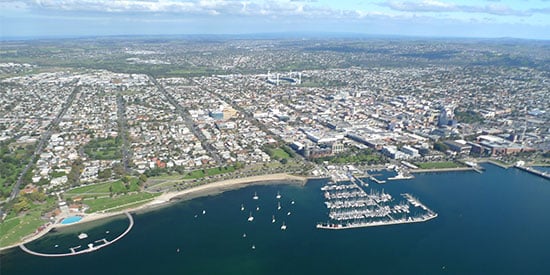A landmark research partnership between Deakin University and global design and engineering firm SMEC will underline Australia's position at the forefront of urban sustainability.
In a rapidly-urbanising world where cities largely contribute to climate change, they can also be an integral part of the solution, if systems are implemented to reduce resource consumption and waste production, minimise environmental impacts, and support ecological regeneration.
The Deakin-SMEC research partnership, formalised in a Memorandum of Understanding (MoU) signed this week, will drive infrastructure and technology developments to further improve urban sustainability in Australia and abroad.
The MoU will see Deakin and SMEC collaborate on various projects that draw on shared expertise spanning architecture, design, urban and regional planning, landscape design, infrastructure engineering, construction, sustainable development and policy.
Deakin University's Dr Phillip Roös, Director of the Live+Smart Research Lab and Associate Head (Industry Engagement) in Deakin's School of Architecture and Built Environment, said the partnership would initially focus on innovative urban design and planning research to improve sustainability and environmental outcomes for City of Greater Geelong growth areas. SMEC has played a major role in the award-winning Warralily residential development in Armstrong Creek.

Aerial view of Geelong City
Dr Roös said the research, which will be extended to other major cities in Australia, would use "enhanced technology, smart city concepts, and a digital twin scenario planning model to test solutions for complex issues in rapid urbanisation.
SMEC and Deakin's Live+Smart Research Lab are also considering opportunities to move from rehabilitation to ongoing regeneration of exhausted quarry and mine sites, supporting ecosystems and surrounding communities in the face of climate change impacts.
"The partnership further provides scope to strengthen the biophilic cities concept for Geelong and Melbourne, building on the example of Singapore as a certified Biophilic City," Dr Roös said.
Singapore, home to SMEC's parent company Surbana Jurong, and Geelong both enjoy UNESCO City of Design status. Deakin was instrumental in the City of Greater Geelong's journey to become Australia's only designated UNESCO City of Design.
Dr Roös said the SMEC-Deakin partnership provided an opportunity to leverage Singapore's international leadership in smart city technology and Geelong's expertise in design thinking.
"Collaboration will enable us to address sustainable and smart infrastructure in both cities to realise the UNESCO sustainable development goals," he said.
Kate Drews, SMEC's Market Director - Urban Communities, said the partnership would elevate SMEC to stay ahead of the research curve.
"We're applying specialist technical capabilities and advanced engineering services to resolve complex issues across infrastructure and urban communities," she said.
"Through our network of global specialists, collaboration with local partners and access to industrial-scale infrastructure, we're turning ideas into commercial reality."
Collaboration will underpin joint proposals and tenders, research project development and grant applications. It also will support PhD programs, and training and supervision in postgraduate industry-related research, including mentoring by industry experts and exposure to ground-breaking projects.
Dr Roös and Danny Ong, Partnerships Manager, Faculty of Business and Law, will manage Deakin's contribution to the SMEC partnership with the support of researchers from other faculties and schools.
More information:






